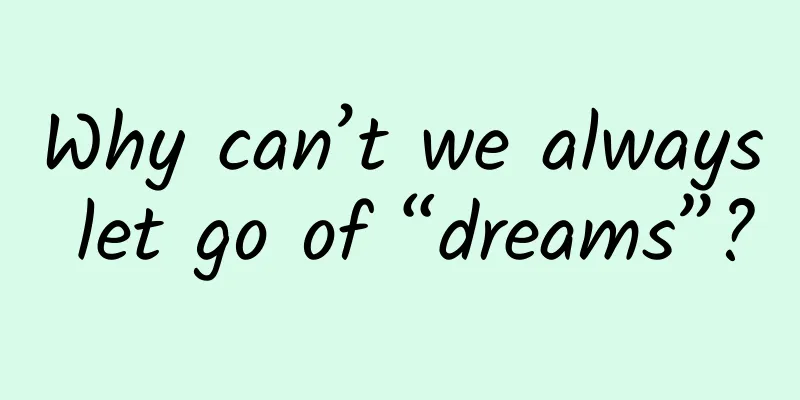Why can’t we always let go of “dreams”?

|
Our material life is prosperous enough, but we still cannot let go of "dreams". This may be because dreams are like the stars, which are completely different from real life, but they really exist. Therefore, dreams stimulate our curiosity and imagination. Even after more than ten years, I still remember a line from the movie "Inception": Remember, you are the dreamer, you built this world, don't be afraid to dream bigger. It sounds like both an encouragement and a source of endless imagination. 01 What is a dream? What exactly is a dream? This question is more complicated and controversial than you might think (Pagel et al., 2001). The traditional view is that dreams are psychological experiences with a story-like nature during the rapid eye movement sleep stage, including vivid imaginations and absurd plots, which always seem real to the dreamer (Antrobus, 1993). However, theorists began to question almost all of these characteristics, and the scientific community has since reconsidered the concept of dreams. Decades of research into dream content have shown that dreams are not as bizarre as we thought (Domhoff, 2007). Recent findings suggest that dreams are not actually unique to REM sleep (Nir & Tononi, 2009). Reports focusing on dreams from non-REM sleep have found that these dreams appear to be less vivid, realistic, emotional, and dramatic than dreams during REM sleep (Antrobus & Wamsley, 2009; McNamara et al., 2007). Research has shown that dreamers realize that they dream more frequently than previously thought and has also shown that dream and waking thought processes are more similar (Kahan, 2001; Kahan & LaBerge, 1994, 1996). 02 Three theories about dreaming Many theories have emerged to explain why people dream. For more than 100 years, Freud's theory of dreams has been particularly influential. Freud believed that the core purpose of dreams is to satisfy wishes. People satisfy unconscious needs and meet their needs through the desired ideas in dreams. He believed that dreams have two meanings, manifest content and latent content. Manifest content refers to the plot of the dream at the surface level. The latent content refers to the hidden or covered meaning of the event. Moreover, Freud believed that in order to analyze a person's dreams, it is necessary to understand the recent events and childhood shadows of the person. Although there has been no research to provide strong support for Freud's theory since then, there are still groups from different cultures who agree with Freud's views until now. There are also some theorists who put forward interesting and inspiring explanations. Rosalind Cartwright believes that dreams provide us with opportunities to solve everyday problems and emotional events. According to his "cognitive, problem-solving view", there is considerable continuity between falling asleep and waking up. Supporters of this view believe that dreams help people think creatively about pressing personal events because dreams are not bound by logic or reality. Cartwright also found that women who frequently dream about divorce-related issues are more able to survive the divorce crisis. In other words, having some bad dreams is not a bad thing. It can give us some hints, allowing us to pay attention to certain things, so that we can think about ways to solve this matter, which may avoid some things from happening. Another scholar, J. Allen Hobson and his colleagues, believed that dreams are just a byproduct of intense activity in the subcortical area of the brain. Periodic neural activation in lower brain centers (especially the brainstem) transmits random signals to the cerebral cortex (the seat of complex thinking). The cerebral cortex naturally synthesizes (constructs) a dream, making these signals meaningful. This theory makes people feel that dreams are just a product and have no meaning, but Hobson believes that dreams must have some meaning. His theory of dreams is different from Freud and Cartwright, and this theory obviously reduces the decisive position of emotional factors. These theories have both supporters and opponents. They agree with the views they think are reasonable and criticize those they think are unreasonable. The more research and inferences about dreams are done, the more mysterious people find dreaming and dreams. 03 Is it really bad to have nightmares? There are many kinds of dreams we have, including ordinary dreams, sweet dreams, and nightmares, but people tend not to care much about the first two, it's just a dream, but they are bothered by nightmares. Moreover, according to research by neuroscientist Jane Merritt and others, people's emotions during sleep are more negative and less pleasant. Negative emotions such as anxiety, fear, anger, or sadness occupy most of the dreams, while positive emotions such as pleasure and love only account for about 30% of our dreams. No one likes to be disturbed by a nightmare after waking up. If given a choice, everyone likes sweet dreams. However, is it really bad to have negative dreams? Sterpenich et al. (2019) found that nightmares can reduce people’s fear and anxiety when facing real situations. In this regard, the researchers explained that nightmares provide us with an opportunity to practice negative emotions, so that when we encounter frightening and anxious situations in real life, we can deal with them more calmly after experiencing them. This explanation is more consistent with Rosalind Cartwright's theory mentioned above, "Dreams provide us with opportunities to solve daily problems and emotional events." This view is wonderful and has a positive suggestive effect. At least it can teach us or comfort us. If we have nightmares again, we can think about "what can I do to avoid bad results?" Or we have been fully prepared mentally, so that we will not panic when the event occurs. Generally speaking, only anxiety disorders and post-traumatic stress disorder (PTSD) may be the cause of frequent nightmares (Love, 2020). Occasional nightmares do not need to be nervous. The reason why dreams are so mysterious may be that they can bring people different emotional experiences. Therefore, people unnaturally connect dreams with reality, and dreams will also affect their emotions after waking up. But in fact, from another perspective, when we dream, we can have unlimited freedom in dreams, release our true self in dreams, escape the constraints of real space and time, and experience a different life in another space, which is also a different kind of fun. |
<<: Can you tell these lines of the reservoir apart?
>>: Your body will say no for you: Why do emotions and stress make you sick?
Recommend
Has the new media dividend passed? You don’t know how to spread content!
We often say that the bonus period of WeChat new ...
If iPhone X and Huawei Mate10 have the same price, which one would you choose?
The Apple iPhone X, which is about to be official...
Alipay's counterattack cuts off WeChat's back door, making Ma Huateng anxious
Apple's strong forcing of the WeChat reward f...
What is the difference between a few dozen yuan and a few hundred yuan iron pan? Don't buy it randomly
In recent years, iron pans seem to be making a co...
The specific practice of "growth hacking": how to "acquire more users"
The theory of "growth hacking" has beco...
How to choose this year's flu vaccine? 14 questions that parents are most concerned about, all answered at once
As autumn and winter arrive, the flu virus also q...
Electric Technology Car News: Can the younger and more alternative Dongfeng Fengshen, inspired by cats, lead the trend in the hardcore SUV trend?
In today's automobile trend, the appearance o...
Creative Guide for Information Flow Promotion in Tourism Industry
In the blink of an eye, it is the end of March. T...
Is it okay to skip the digital anal exam if you think it's too embarrassing or uncomfortable? Don't, because...
"Digital rectal examination is uncomfortable...
Data fraud black industry technical post: How to increase the traffic of WeChat public accounts, Weibo celebrities, and live broadcast influencers
If you only look at the fraudulent behavior of We...
What are the advantages of Baidu Smart Mini Programs compared to WeChat Mini Programs?
Q: What are the advantages of Baidu Smart Mini Pr...
Analysis of 5 different cross-border e-commerce operation models
This article analyzes different cross-border e-co...
Artifact recommendation! 10 niche, easy-to-use and high-end operation tools!
It is said that if the underwear is well chosen, ...
Yuanli.com earns precise private domain monthly income of 60,000+, and unique gameplay of doubling traffic
Yuanli.com earns precise private domain with mont...
How to do data analysis for information flow promotion? Avoid these 4 pitfalls!
If you work in bidding, how can you grow into a p...









